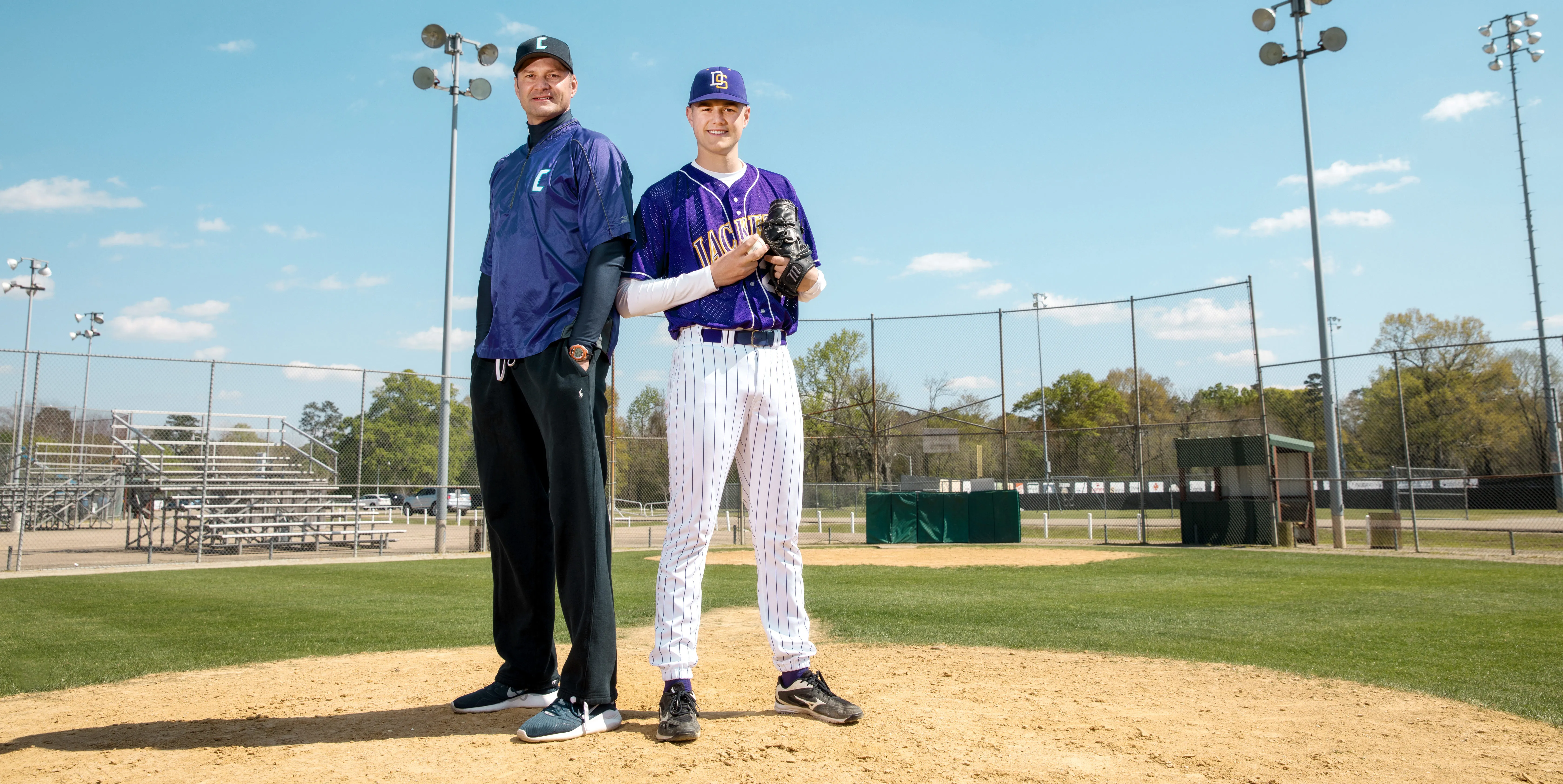
Professional pops: Former star athletes teach lessons that go beyond the game
Athletic glory is fleeting. It might end in high school, or at the end of a long professional career. But it always ends.
Ben McDonald, a multisport star at Denham Springs High and LSU, was only 30 years old when shoulder injuries ended his major league pitching career. He visited some of the top specialists in the country and went through years of painful rehabilitation, but nothing worked.
“While it was disappointing and sad, I’m OK with it,” he says. “I busted my tail trying to come back, but it wasn’t meant to be.”
As McDonald’s athletic career was ending, his daughter was getting interested in basketball and softball, so he began coaching her youth teams. A few years later, their traveling fast-pitch softball team won two championships and produced 11 Division I college players, he says.
Of course, very few teams will be as successful. But McDonald and other former LSU stars who coach young athletes, including their own children, say the skills and lessons they impart have value far beyond wins and losses.
“I tell my kids all the time: ‘You’re going to compete one day for a job,’” McDonald says. “If you learn to compete now, you’ll compete for the rest of your life, and you’ll be successful.”
Baseball in particular teaches resilience, since even great players fail to get a hit 70% of the time. This summer, McDonald will coach a baseball travel team of 17-year-olds, including his son.
He loves spending time with his children, but he gets more nervous watching them play than he ever did pitching in the Olympics or in a major league stadium in front of 55,000 fans.
“When your kid’s on the mound, you don’t control anything,” he says. “It’s up to them to go out and perform, and you hope you’ve coached them well.”
McDonald says when he was young, coaches ruled “with an iron fist.” During his years of youth coaching he has learned that while “tough love” works with some kids, encouragement and gentle instruction is more effective for others.
“When they told us to do something years ago, we just did it,” he adds. “Kids these days, they want to know why.”
Parents are different now too, he says. Some think they know more than the coach and aren’t afraid to say so. McDonald doesn’t mind biting his tongue on occasion, but as a volunteer, he’s only going to put up with so much.
Former LSU baseball star Ryan Theriot played for championship teams in college and in the major leagues, and he helps train professional athletes as director of sports operations for Traction Sports Performance in Baton Rouge. But he still sometimes deals with players and parents who question his evaluations of who should play which position.
“I always challenge them to find somebody that’s seen more baseball,” Theriot says.
Theriot coaches the 12-year-olds on his son’s baseball team and a softball team that includes his 11- and 9-year-old daughters. He finds the girls are more attentive and tend to make adjustments more easily. He tells his players that developing the right habits in sports, like proper body language, having a plan and paying attention to the details, will help them win off the field as well.
Theriot says he’s careful not to show favoritism toward his own kids when coaching. In fact, he sometimes finds himself being tougher on his son than the other players. His son called him “coach” around the house recently, which they both found funny.
Theriot says he had both good and bad coaches. The best coach, he says, is the one who can be a “chameleon” and reinvent himself. “You can’t yell at certain kids,” he says. “You have to yell at certain kids. Some can deal with it, and some can’t, so you have to identify those kids early or you’re going to lose them for the rest of the season.”
Sometimes he’s hard on the team after a loss or even a win, but other times he’ll focus on the positive even in defeat, depending on what he feels the team needs to hear. And he remembers a lesson he learned from former LSU baseball coach Skip Bertman: When you tear a player down, you have to quickly build them up again.
When Theriot was a freshman, Bertman called Theriot “the worst infielder he’d ever seen” in front of the entire team. But an hour later, Bertman put his arm around him and reminded him that he was on the team for a reason.
“They don’t care how much you know until they know how much you care,” Theriot says.
Former LSU basketball standout Ricky Blanton played professionally in the United States and overseas. His father ran the Boys & Girls Clubs in his hometown of Miami, Florida, so he coached youth basketball when he was a senior in high school.
Last year, Blanton coached three basketball teams including each of his three children, who are 10, 8 and 5 years old. Needless to say, the skill level is much lower, and the competition less fierce, when you’re dealing with very young kids.
“I’ve had some first-time parents say, ‘Oh wow, we can’t catch the ball, we can’t hit the basket, everybody takes the ball from us,’” he says. Blanton reassures them: Just let it unfold, and realize we’ll be better next year.
Blanton says he has a tendency to focus more on the other players than his own children. He knows he can always help his own kids in the driveway after practice. “I keep the expectations [for my children] within reason, because they’re still on their journey like every other kid,” he says.
Blanton says his approach to coaching is twofold. Of course, he teaches the fundamentals of the game, like how to shoot and play man-to-man defense. His second responsibility is teaching everything that goes along with being an athlete. Good sportsmanship, good practice habits, being a good teammate, and generally doing things “the right way” are all lessons that also apply to life off the court.
There will be time for more serious competition when the athletes reach high school. For now, if the kids have a good experience, learn a lot, and want to play again next year, Blanton figures he’s done his job.
“It’s not about winning every game,” Blanton says. “It’s about teaching, and you have to value the journey for the young athlete.”











